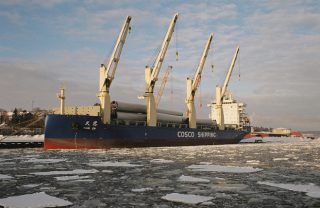Chinese cargo vessel Tian En, specially built for polar waters, has arrived in the French port of Rouen, having traveled via the Arctic’s Northern Sea Route or “Polar Silk Road” for the first time.
The route links Asia to Europe through the Western Pacific Ocean, the Bering Strait and the Arctic Ocean, and is shorter than the Suez Canal route by around 2,700 nautical miles.
Tian En set sail on August 4 from Lianyungang City of east China’s Jiangsu Province, heading for Europe.
The COSCO-owned heavy-lift ship is loaded with wind power equipment imported by Europe from China.
Commercial shipping in the Arctic has been under spotlight over the recent period, especially upon Maersk’s announcement on sending a containership through the Northern Sea Route to explore the commercial potential of the lane.
Commenting on the journey, the Clean Arctic Alliance called on COSCO to make public the nature of the fuel that the Tian En has used and carried through Arctic waters.
Environmentalists have been very vocal about the risks emerging from the practice, due to the lack of available infrastructure in the area because of its remoteness to deal with a potential oil spill and shipping incidents.
“With Arctic summer sea ice at approximately half the extent it was in the 1970s and half the volume, and following the news that the region’s strongest sea ice has broken up twice this year, for the first time on record, using heavy fuel oil to power shipping in the Arctic is a poor choice. It not only increases the risk of oil spills, but also generates emissions of black carbon, which exacerbate the melting of both sea and glacier ice in the Arctic region,” Clean Arctic Alliance Lead Advisor Sian Prior said.
“Cosco should be leading a vanguard of companies interested in shipping commercial goods through the Arctic, as they move towards clean and renewable forms of propulsion for Arctic shipping.”
“There is nothing for shipping companies to celebrate about the melting of the Arctic ice. Using the Arctic as a passage is a privilege that brings responsibility,” said Chen Jiliang, researcher from Greenovation Hub, an environmental NGO based in Beijing.
Source: http://worldmaritimenews.com


